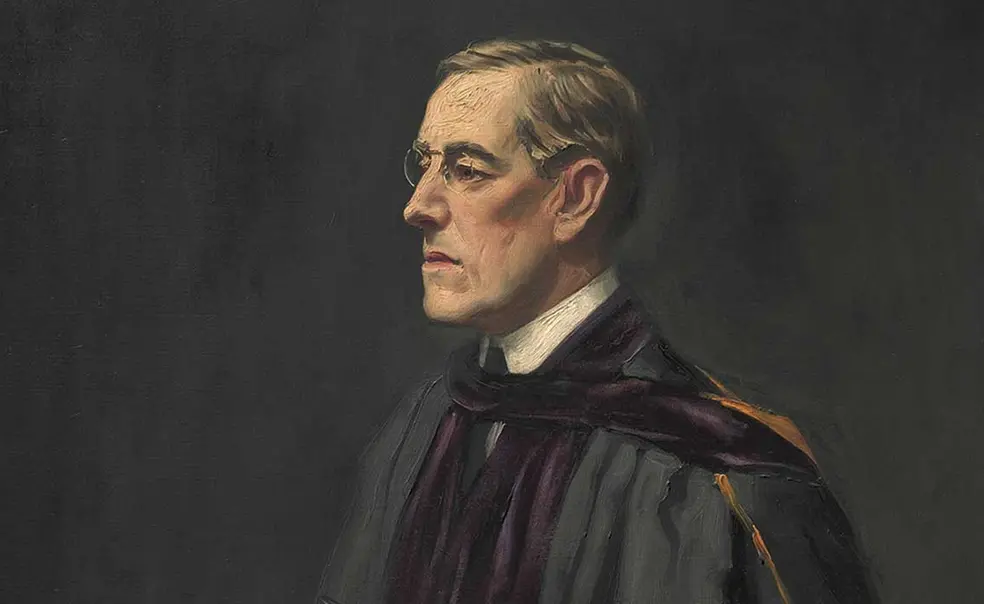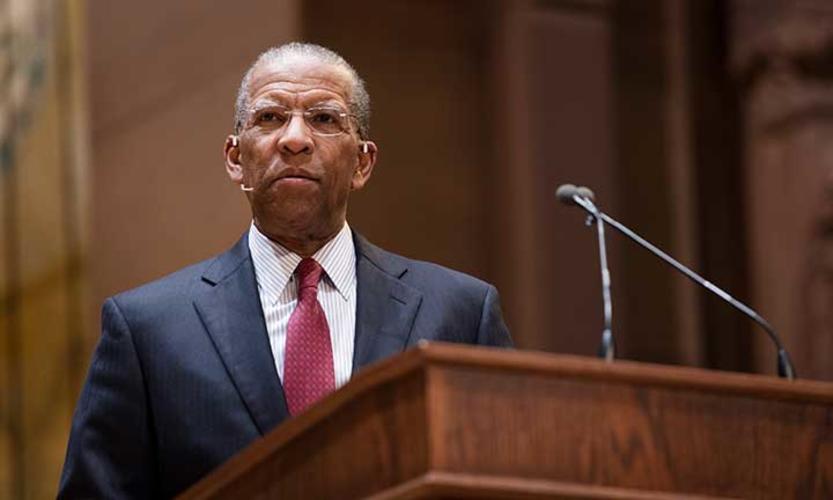University Won’t Rename Wilson School or Wilson College
New initiatives to address diversity concerns
The University’s board of trustees has rejected a call by a student activist group to remove the name of Woodrow Wilson 1879 from the School of Public and International Affairs and one of Princeton’s residential colleges because of his views and actions on race. But the board said the University must be “honest and forthcoming” about its history and recognize Wilson’s “failings and shortcomings” as well as his achievements.
At the same time, the board said the controversy over Wilson’s legacy was “emblematic of larger concerns” about the University’s commitment to diversity and inclusivity. Efforts should be “redoubled” to ensure that Princeton “embraces, respects, and values all members of its on-campus and alumni communities,” the trustees said, and a new board committee will monitor the progress.The renaming issue was raised by the Black Justice League – citing Wilson’s record on racial issues as both University president and U.S. president – during a 33-hour sit-in in November at President Eisgruber ’83’s office in Nassau Hall.
A special committee of the trustees was created to consider Wilson’s legacy and whether Princeton should change how it recognizes that legacy. The full board, meeting on campus over the weekend, endorsed the committee’s 13-page report, and it was released April 4.
The board approved these actions:
- Creation of a “pipeline program” to encourage more students from underrepresented groups to pursue doctoral degrees and careers in academia. The goal is to provide a step toward more diversity among graduate students, faculty, and postdocs. “I hope this will be a leadership step for Princeton as a university that will benefit not only us, but other institutions around the country,” Eisgruber said.
- Support for educational initiatives that provide a broader understanding of Wilson and especially his racist attitudes, as well as of parts of the University’s history “that have been forgotten, overlooked, subordinated, or suppressed.”
- Broadening campus art and iconography to better reflect the diversity of the University.
- A change in the University’s informal motto, taken from Wilson’s address at Princeton’s sesquicentennial in 1896 and modified a century later to the familiar “Princeton in the nation’s service and in the service of all nations.” In line with a suggestion by Supreme Court Justice Sonia Sotomayor ’76 as she received the Woodrow Wilson award in 2014, the motto now reads: “Princeton in the nation’s service and the service of humanity.”
The board also called on the administration to “bring a more diverse presence to the campus” by inviting suggestions from the University community to name buildings or other spaces not currently named, such as the atrium of Robertson Hall.
Eisgruber said in a statement that he agreed fully with the committee’s analysis and recommendations, and that implementation of the new initiatives will begin immediately.
“Last fall’s student protests and the thoughtful discussions that followed have changed how this campus will remember Woodrow Wilson and, I suspect, how our country will remember him as well,” he said. “While I continue to admire Wilson’s many genuine accomplishments, I recognize the need to describe him in a way that is more balanced, and more faithful to history, than this University and I have previously done.”
What’s your view?
Share comments on the trustees’ decisions below, or send a letter to the editor.
In seeking input from members of the Princeton community, the board said that it received comments from more than 700 people in small-group meetings, larger forums, and postings on a special website. Supporters of changing the name of the Wilson School and/or Wilson College were in the minority, the board said.Not all members of the special trustee committee agreed that Wilson’s name should remain on the school and the college, the report said, “but in the end our collective judgment was that the names should not be changed.” Brent Henry ’69, chair of the committee, said there were no dissents from the report by members of the committee or of the full board.
In a statement released later in the day, members of the Black Justice League said that they were disappointed but not surprised by the trustees’ actions. “Princeton’s decision today demonstrates unambiguously its commitment to symbols and legacies of anti-Blackness in the name of ‘history’ and ‘tradition’ at the expense of the needs of and in direct contravention with the daily experiences of Black students at Princeton,” the statement said.
Henry said that members of the Black Justice League had been “well represented” in attending sessions scheduled by the special committee to hear the views of the Princeton community.
Both Henry and Eisgruber cited the role of alumni who offered their views to the administration and to the committee. “I received a number of thoughtful communications, many of them very personal in character, as they talked about their experiences on this campus, they talked about their views about Wilson and what they were learning through the process,” Eisgruber said. “This was really a special process in which Princeton alumni were engaging with the University and with one another about what our history meant and how we should understand what it means for our future.”













2 Responses
The Rev. Gregory J. Winsky ’71
9 Years AgoChanging the Motto
When I left the campus in June 1971 after receiving my commission in the Navy, the University’s “informal motto” had plain meaning, and a special meaning to me. When that motto was “expanded” at my 25th, I was surprised, and somewhat bemused. But having learned that this motto has been changed yet again to incorporate the word “humanity,” I can’t help but recall the words that Dostoevsky put on the lips of one of his least admirable creations: “[T]he more I love mankind in general, the less I love people in particular.” I pray that stare decisis will be applied to our “formal” motto.
Bill Davis ’97
9 Years AgoChanging the Motto
I understand that Princeton’s new informal motto, “Princeton in the nation’s service and the service of humanity,” means to suggest a broader mandate than its more euphonic predecessor. To me, it does the opposite. Every year in the United States alone, more than 9 billion farm animals are confined to unnatural and often abusive environments before slaughter, millions of adoptable dogs and cats are “euthanized,” and hundreds of thousands of animals are subjected to painful, disfiguring, and ultimately fatal experiments in laboratories — all in the service of humanity. For those of us who focus our service efforts on helping nonhuman animals, Princeton’s new motto is myopic.